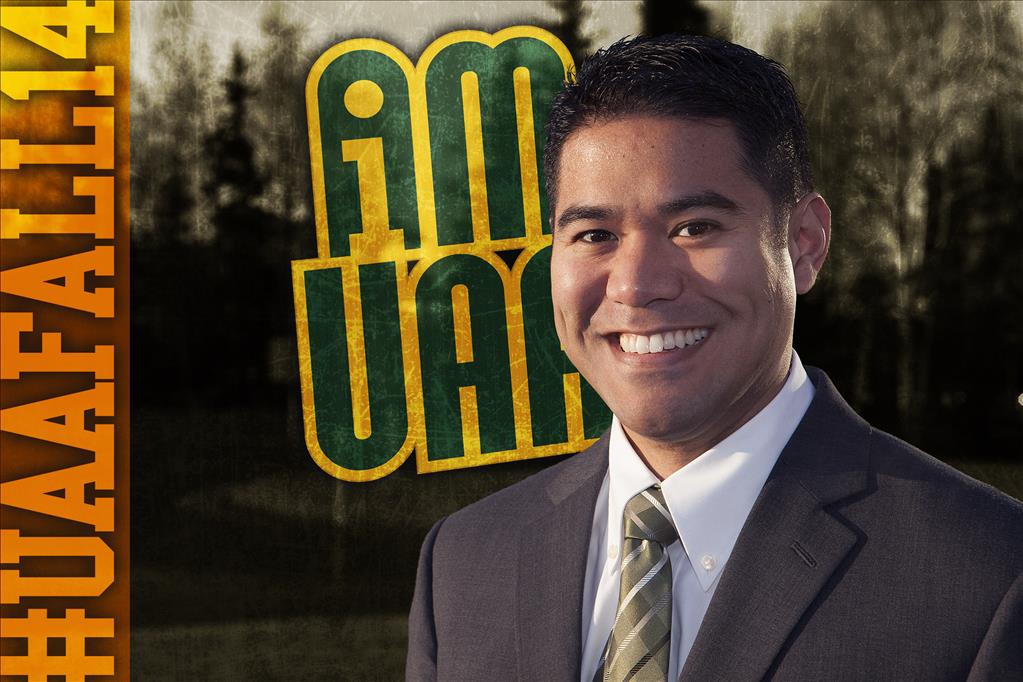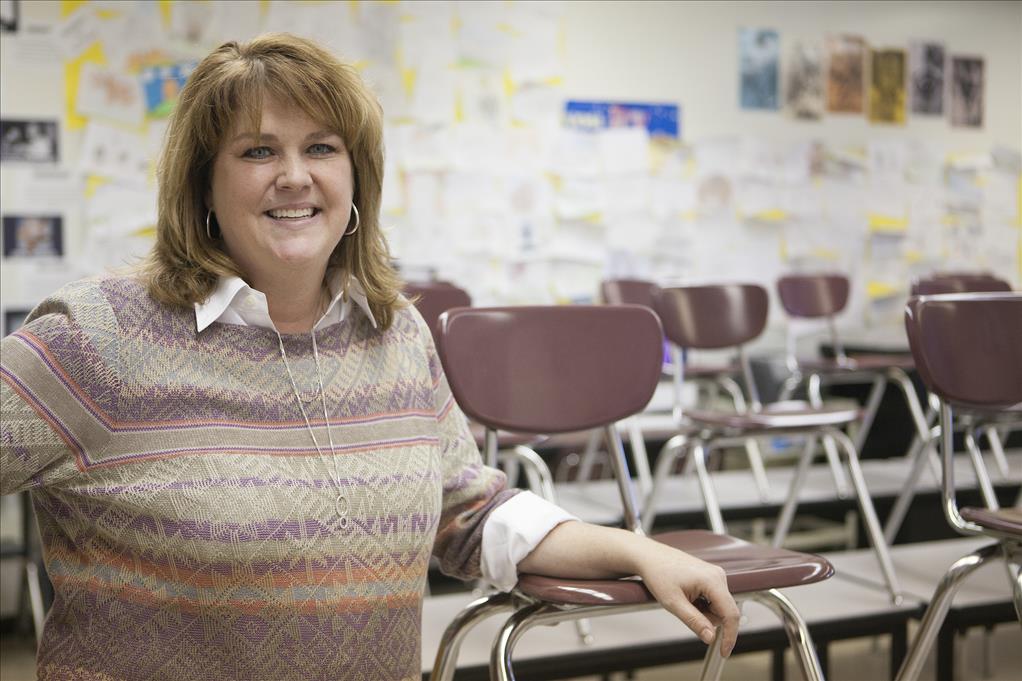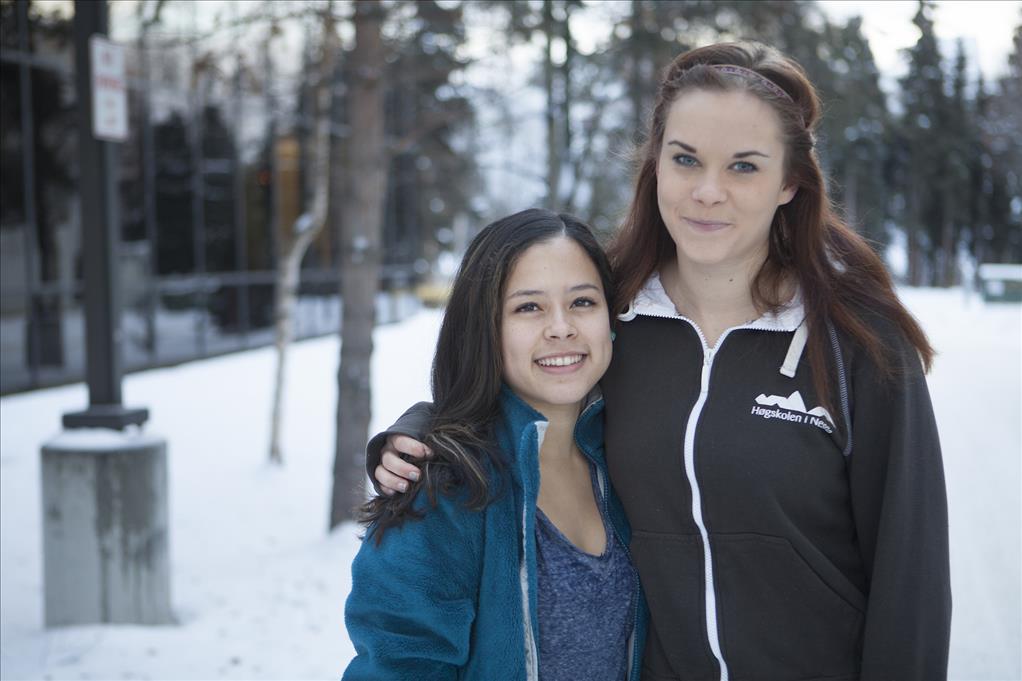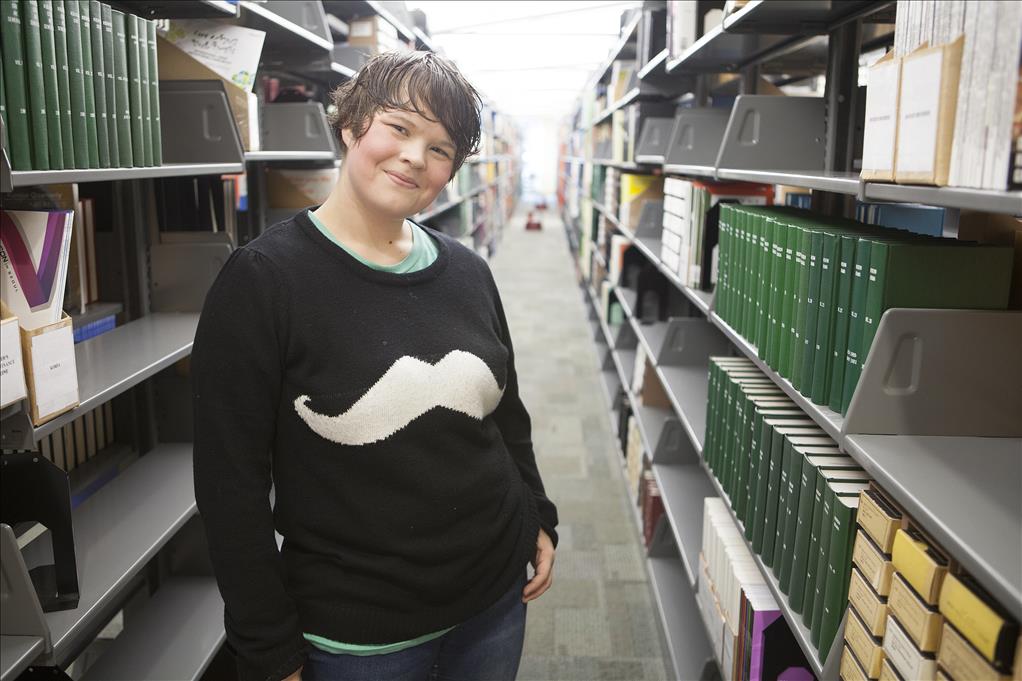Helping refugees toward a new, safer life in Anchorage
by Tracy Kalytiak |
Twenty-three years ago, Hari Kafle and his extended family hastily gathered clothes, blankets and food and fled their 35-acre farm on foot in the middle of the night.
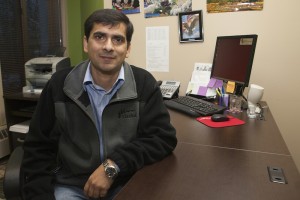
Hari Kafle, a refugee from Bhutan, arrived in Anchorage five years ago. He now works for Catholic Social Services, helping other refugees adjust to new lives in the United States. (Photo by Philip Hall/University of Alaska Anchorage)
Kafle's family had lived in Southern Bhutan for generations. They were ethnic Nepalis-they spoke Nepali rather than the Bhutanese language and practiced Hinduism rather than the Bhutanese faith, Buddhism. In 1988, the Bhutanese government began persecuting ethnic Nepalis in Southern Bhutan. Ethnic Nepalis resisted efforts to extinguish their language and cultural heritage, so the Bhutanese government cracked down.
Kafle's family risked imprisonment or death, so, in 1991, they and thousands of other ethnic Nepalis fled Bhutan, crossing a sliver of India to reach Nepal.
"It was a tragedy," said Kafle, who was then 15. "We had no notice. We had to set our animals free-it made my mother cry hearing the animals make their noises. We didn't know what was going to happen, where we were going to end up. Everything was uncertain, unprepared."
Kafle and his parents, five brothers, three sisters and all their own children made their way on forest paths to Bhutan's border with India and then, by rented truck, to the homeland they'd never seen. They weren't citizens of Bhutan and, despite sharing ethnicity, weren't citizens of Nepal, either. So, Kafle and his family lived in a temporary camp by the Maidhar side of the Kankai River, among droves of other refugees from Southern Bhutan. His 5-year-old niece and 2-year-old nephew died due to unsanitary conditions there before the UNHCR-the United Nations' refugee agency-intervened and moved the refugees to cleaner quarters.
"We lived there, me and my family, for more than 18 years," Kafle said. "We learned how important government is, how important countries are. We got a chance to go to America, to go have our life."
Providing a warm welcome
UAA's Center for Community Engagement & Learning is hosting a Think Tank session spotlighting RAIS-CSS' refugee resettlement efforts. The session is scheduled for Thursday, Nov. 6, from 11:30 a.m.-12:45 p.m., in the UAA/APU Consortium Library, Room 307.
The focus question will be: How can our community support the transition and integration of refugees resettling in Anchorage?
CCEL's Think Tanks help nonprofit agencies engage with UAA students, faculty, staff and community individuals to achieve change.
"The idea was, all these nonprofits we work with all have something they're dealing with," Judith Owens-Manley, CCEL director, said. "These are social issues, so how would we as a community brainstorm these issues together?"
Dr. Rebecca Robinson, an assistant professor of psychology at UAA, worked with RAIS for nearly five years-first as a student and now as a faculty member. Robinson's research group, the Community Psychology Research Collaborative, which she directs, is currently working on a project called the Alaska Refugee Needs Assessment. CCEL administers the Selkregg Community Engagement & Service Learning Award, which is funding the study.
"One of the very clear findings emerging from the data thus far is the need for community engagement with the refugee community," she said. "Refugees are not something other-rather, they are of our community. Thus, the Think Tank is a great opportunity to start this conversation!"
Finding firm footing
Jessica Kovarik, RAIS' program director and state refugee coordinator, first met refugees when she was a young girl.
"One of my first friends in grade school was a Hmong refugee whose family, after fleeing their homeland of Laos, arrived to my hometown in Minnesota," she said. "Through my friend, her family and other refugees in Minneapolis, I became familiar with how refugees both struggle and thrive in their new homes in the U.S. Growing up in Minneapolis, I was lucky enough to have my eyes opened to refugee issues at a young age and had many refugee friends, teachers, doctors, neighbors and colleagues."
Kovarik volunteered with several refugee resettlement programs in the U.S. and has consulted with international organizations like Save the Children and International Rescue Committee on projects related to education programs in refugee camps. She's also worked with resettlement programs in Denver, including a refugee artisan program.
Worldwide, more than 15 million refugees have fled their home countries due to persecution and war. Fewer than 1 percent are sent for resettlement in a third country, such as the United States; many refugees, like Kafle, wait years in a camp before finding a safe home in this country.
The U.S. government decides how many refugees will be admitted. This fiscal year, the U.S. will receive 70,000 refugees. Between October 2013-September 2014, 147 refugees arrived in Alaska. Some stay, some move to join other family members in other U.S. states.
Refugees arrive in Alaska with few personal belongings and must quickly learn to navigate into a new life that's set in a place with a foreign culture and foreign language.
"There are many adjustments refugees face when they arrive," Kovarik said, "including adjusting to a new climate-many have never seen snow-a new culture, new language, new food and a new lifestyle."
Bridging old, new lives
RAIS employees set up refugees' new homes, pick them up from the airport and get them settled. Then, they help them navigate the bus system, bring them in for a health screening and help them follow up with any medical concerns. In their first weeks in the U.S., they attend classes to orient them to the U.S. and to U.S. culture, enroll in English classes, get their documents, enroll in public assistance and seek employment.
"We provide case management and employment services to help them get and maintain employment," Kovarik said. "Our program serves as a bridge between their former lives and their new lives in the U.S., but our clients also rely on many community partners to meet their needs and those of their families."
The Alaska Department of Health and Human Services, Nine Star, Alaska Literacy Project, Division of Public Assistance, Anchorage Neighborhood Health and Providence Family Medicine help refugees make the transition.
"We also have a strong partnership with Anchorage School District, which does a wonderful job supporting school-aged refugees getting enrolled in school," Kovarik said.
By the end of their first year in Alaska, 86 percent of the refugee families CSS-RAIS services no longer rely on public assistance, Kovarik said.
"While refugees often arrive with limited English, they arrive with resilient spirits ready for a new start," Kovarik said.
People in the Anchorage community have, over the years, provided a warm welcome to refugees, Kovarik said, though some aren't aware of what a refugee is and how a refugee would come to live in Alaska.
The upcoming Think Tank presents an opportunity to educate people about what it means to be a refugee.
"Hopefully this outreach will encourage more engagement with our program and support for the refugee community," Kovarik said. "I hope this event will bring together members of the community to discuss challenges the refugee community faces and help strategize ways the community can continue to improve support to refugees."
The Think Tank about refugee resettlement is just one of the events scheduled for CCEL's annual ENGAGE Week, Nov. 2-7, with the theme, "A Welcoming Community." ENGAGE Week will feature dialogues, panels and workshops that are open to all campus and community members.
Written by Tracy Kalytiak, UAA Office of University Advancement
 "Helping refugees toward a new, safer life in Anchorage" is licensed under a Creative Commons Attribution-NonCommercial 4.0 International License.
"Helping refugees toward a new, safer life in Anchorage" is licensed under a Creative Commons Attribution-NonCommercial 4.0 International License.










